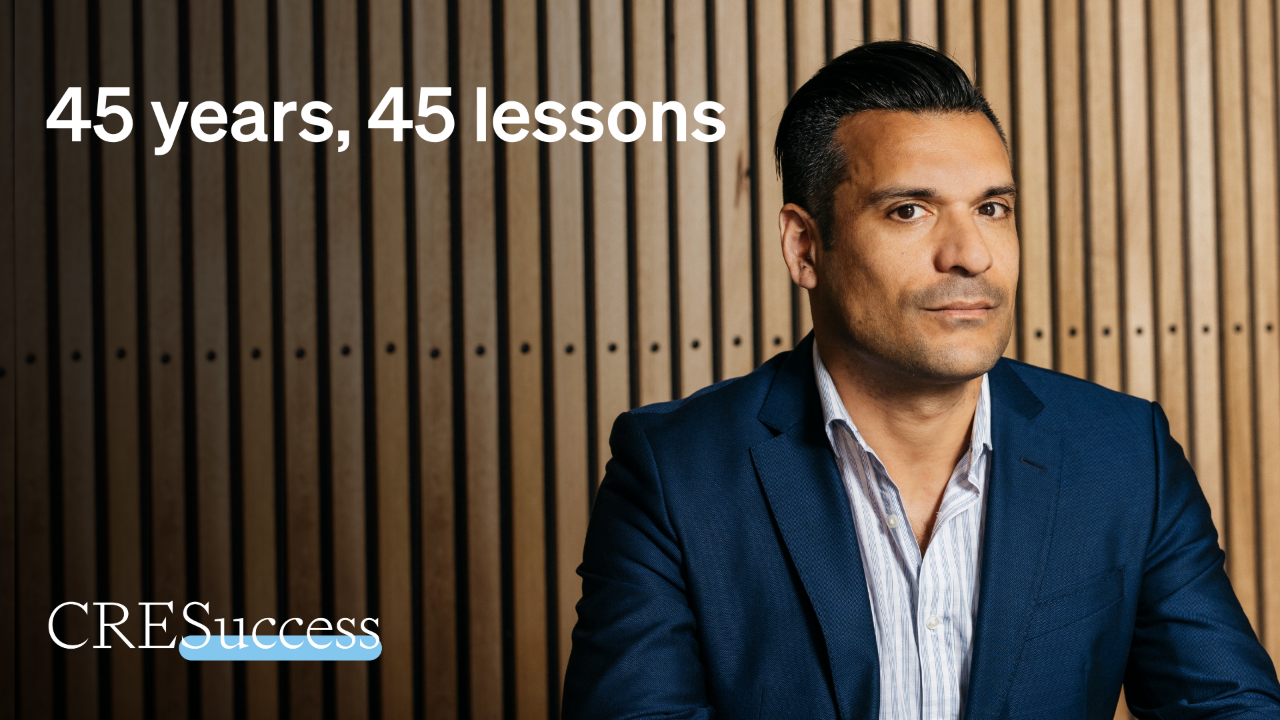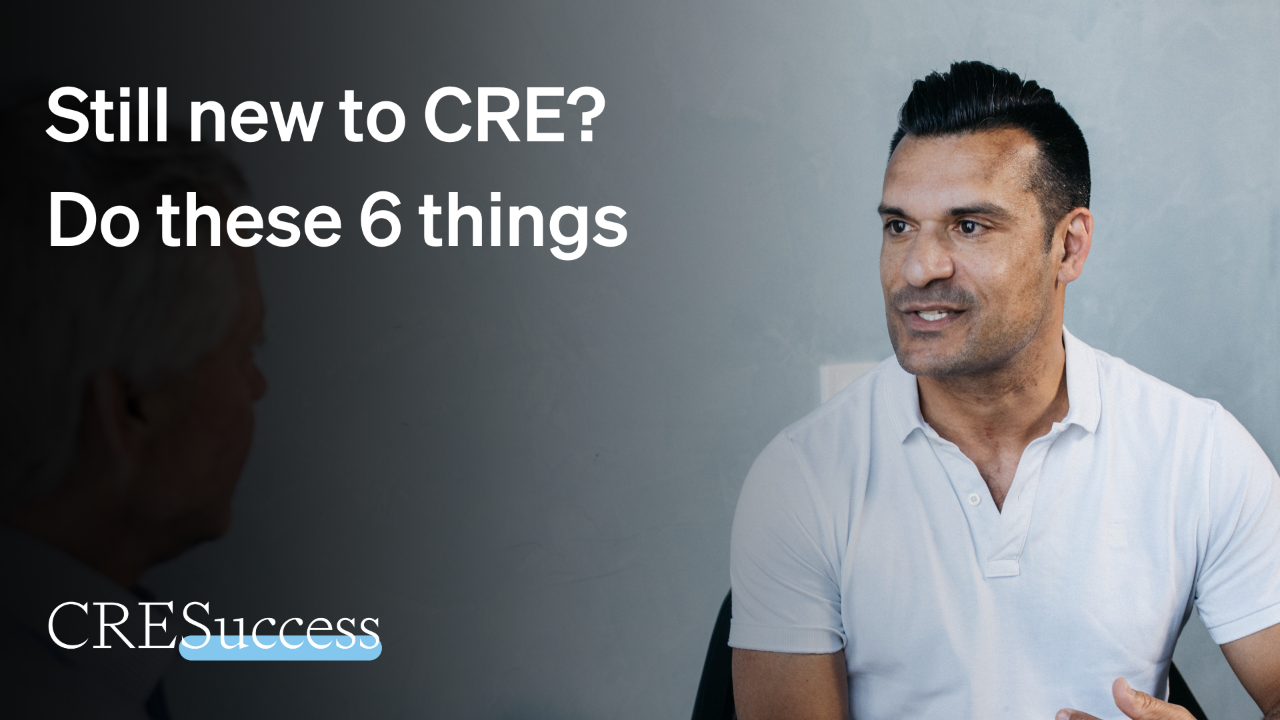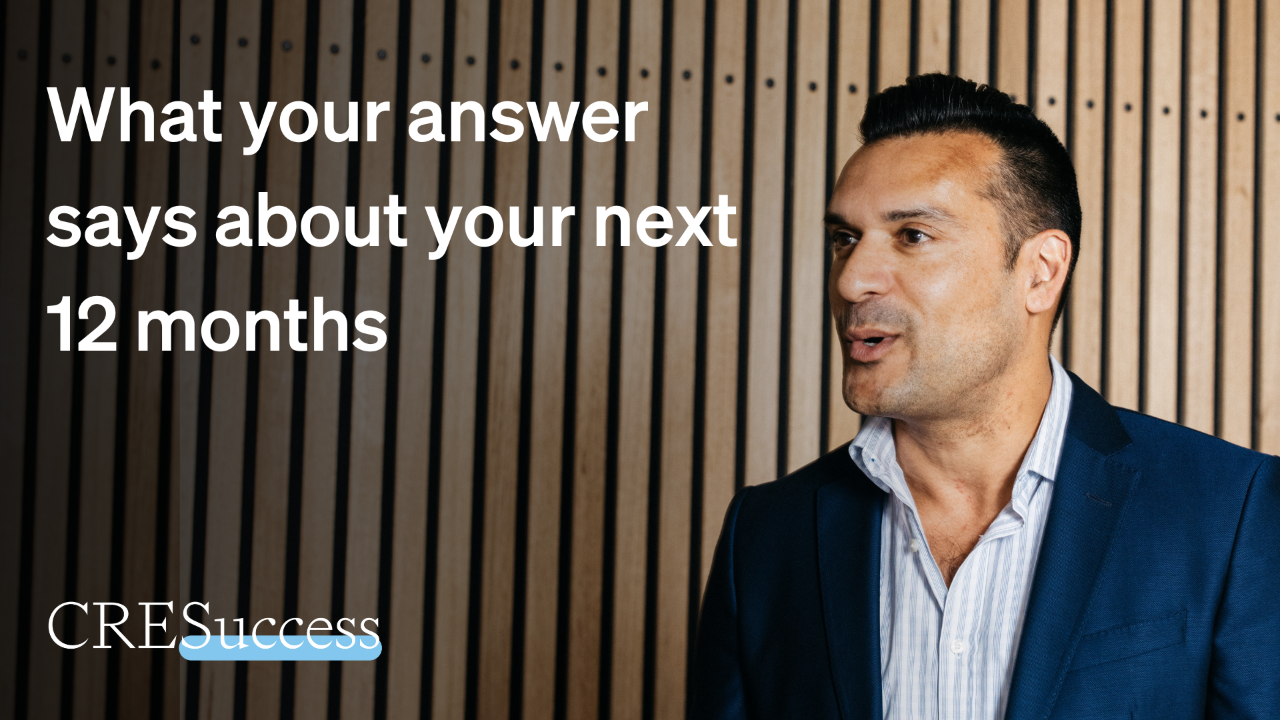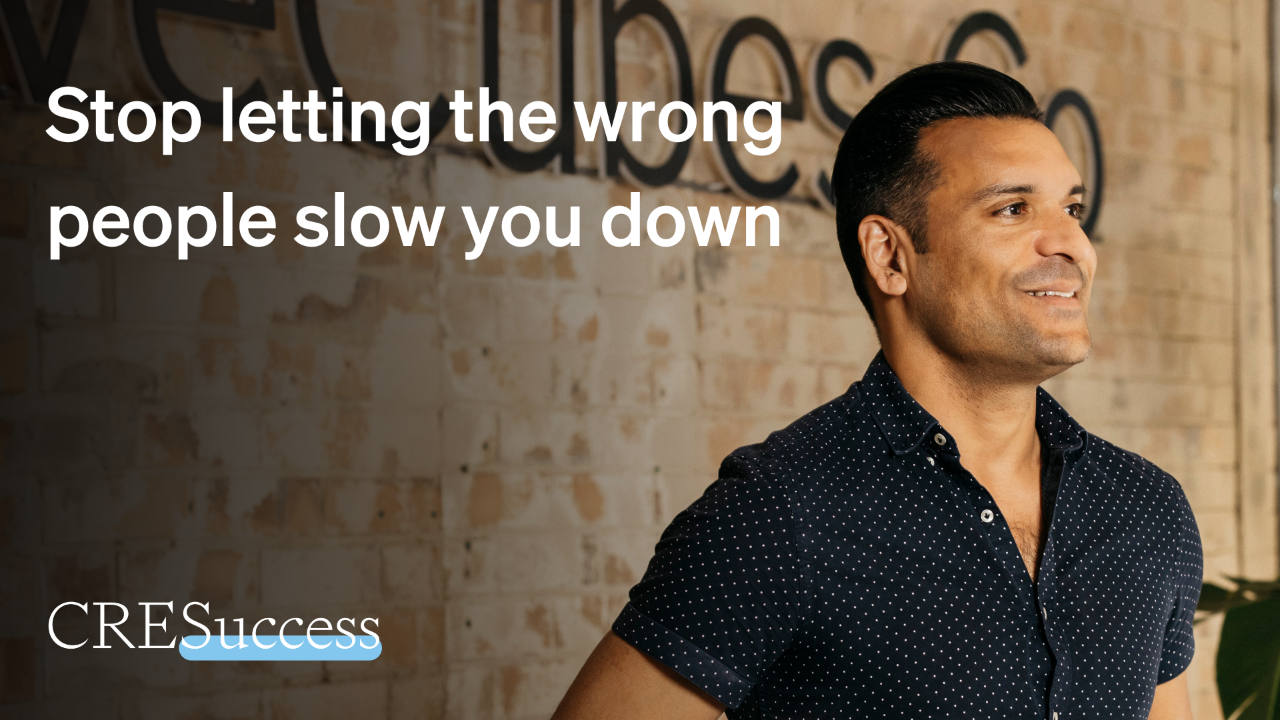What 45 years have taught me.
May 07, 2025
CRE Success Principle: What you do often carries more weight than what you say. Because whether you realise it or not, your team is watching...not just your results, but also the habits you have, the way you react, and how consistent you are.
I turned 45 last month. And to mark the occasion, I decided to write down 45 lessons I’ve learned along the way – about leadership, life and business.
In this episode, I’m sharing the first 15.
These aren’t ideas pulled from books or podcasts – they come from real, lived experiences: running a business, coaching clients, raising a daughter and navigating the ups and downs of professional life over the past two decades.
From “listen more than you talk” to “delegate before you’re ready,” these lessons have shaped the way I lead, coach and live today. They reflect not just what I’ve learned, but what I try to apply and improve on every day.
Some of these lessons came quickly. Others took years to truly understand – often through trial, error and a fair bit of self-reflection. And, I’ll admit, some I’m still working on.
If you’re leading a team, growing a business or simply aiming to be more intentional in how you show up, I think you’ll find something here that hits home.
This is Part 1 of a three-part series. I’ll share the remaining 30 lessons in the next two episodes – I’d love for you to join me.
Episode transcript:
I turned 45 years old last month and decided to sit down and write 45 lessons that I've learned.
Really, the ones that I've learned probably more over the last five years – or a few of them I learned in my thirties – but these are the 45 ways that I want to lead this industry, advise my clients and live my life.
Hello, welcome to episode 219 of Commercial Real Estate Leadership. I am your host, Darren Krakowiak. Thanks so much for joining us for today's episode. I really appreciate you being there.
If you are a fan of the show and you enjoy the content that we're putting out there, one way that you can support the show is by giving us a rating or review on Apple Podcasts or Spotify.
Or, if you are watching us on YouTube, by leaving a comment or making sure that you are subscribed to the channel. If you're not on our YouTube channel, check us out at CRE Success.
As I mentioned at the top of the show, today's episode is 45 lessons that I've learned over 45 years of life.
Now, I'm not sure if I'm going to get through all 45 in this episode so we might have to do this content over two parts.
When I started writing out these lessons, it wasn't too hard at first, but I did eventually need to go through some of my past articles, podcasts and other notes that I've kept to get to 45.
Then, I thought of a few more, so I started culling a few and this is what I've landed on as those top 45 lessons.
If this resonates with you, I'd love to hear from you which one it is. You can tell me the number or the lesson that you particularly enjoyed by DMing me on Instagram – we are @cresuccess, if you'd like to send me a DM on Instagram. Or you can send me one on LinkedIn; you can find me Darren Krakowiak, CRE Success.
So without explaining it any further, let's get into these lessons.
The first one: listen more than you talk.
I think this is important because you'll learn a lot more this way and you'll also give better advice.
I find myself sometimes wanting to give advice to my clients when they are telling me about a certain situation; I think, ‘oh yes, I've heard this story before, I know what will help them’. But they don't know that I know what they're needing to hear if I don't show them that I'm listening in completion to what they have to say.
So, I need to stop and listen to everything that they want to tell me.
The other thing that's important is that, sometimes, the story doesn't pan out as I've expecting it; so, if I butt in and start giving advice that I think they need, that can often lead to me not giving the right advice.
So, listening more than you talk and making sure you truly understand what people are saying is the first lesson.
Number 2: authenticity beats perfection.
So, people appreciate realness, and one way that I've applied this lesson is through content.
I've become a little bit more, I guess, relaxed about the content that I do put out there because, rather than editing it profusely or doing 18 takes to get the perfect episode or the perfect video or the perfect email, I know that it's better for me to be true to myself.
It is also quite hard if I'm pretending to be someone else to keep up that act over a long period of time.
If you're just real and be yourself, then you don't need to pretend and you don't have to keep the act up because you're not putting one on.
Number 3: if it's not a hell yes, it's a no.
This is about choosing to do things that really excite you, deserve your time, and are aligned with your interests, passions and beliefs. While I think this is to do with clients, it works both ways.
So, recently I had a client who seemed like a good fit. They started working with me and then, after a couple of months, they said, ‘look, I'm just not feeling like it's working out’.
And I said, ‘that's absolutely fine. I really appreciate the fact that you've let me know. Let's just depart as friends’.
This happens sometimes. If it's not a hell yes, then it's a no. Although it was a hell yes, it then turned out to be, well, I'm not sure. Well, if you're not sure, then let's stop.
If that happens when I work with clients in the first three months, that is a right for both me and the client. Because, if they're not feeling it, then let's not go for the whole year.
But also, if I'm not feeling it and I've got a client who's not really engaging with the process, then they're not going to get the value out of the work that we're doing together.
So, it's not appropriate to try and force things and to make things happen if it's not the right fit.
Number 4: invest in relationships.
Relationships yield better returns than most investments and I've been trying, more recently actually, to have a bias towards accepting invitations.
When someone invites you to something, they're trying to put their hand out, to extend to improve or grow the relationship that they have with you – and that's an opportunity that you can choose to accept or not.
I've been trying recently to accept those invitations. I talked about the episode where we talked about expectations; I think it was episode 215 where I was, you know, the football thing, the book launch.
We've got some birthday drinks coming up this weekend with a friend I haven't heard from for a while, but they invited me to their birthday drinks and I thought, ‘well, yeah, I should go, right? ‘
Invest in relationships. They're the things that ultimately will last longer than your business does or your professional life.
Number 5: revenue solves most problems, but not all problems – and your integrity is more important.
Your integrity is priceless. So, if you are putting your integrity on the line in order to win work or to do work, or to get a deal done, then it's probably not worth it.
So, revenue's important, but not if it comes at the price of your integrity, your reputation and your values.
Number 6: never email or text when you are upset.
If you need to get something off your chest, write the email or the text, then wait. And once you've calmed down, once the temperature has been reduced, you then reread it. If you're still happy with it, then you can send it.
But what I have often found is that I reread it and think, ‘who was the crazy person who was writing this message?’ And it was me, when I was upset. So don't send emails or texts when you're upset. Pretty simple.
Number 7: exercise is non-negotiable.
My exercise regime is five times a week, and while that might not be the right amount for you, but do whatever is right for you.
I think a healthy leader is an effective one, so making sure that you get yourself the exercise, the activity that is going to help you feel healthy, a healthy body and healthy mind is, I think, critical.
Number 8: always be learning.
When you stop learning, you stop growing. And if you're not growing, you're dying.
So, pretty simple is to make sure that you commit to continuous improvement, that you're always looking for opportunities to learn because that's where the growth is.
Number 9: delegate before you are ready.
I was having a conversation with a client last week about the importance of delegating and letting go.
And he told me about a principle that he learned from another coach that he was working with, which is ‘No job is for me’.
This is basically saying that ‘the more things that you can have other people do for you, the better’ – and it's really about trusting your team to set up.
I've been working with my virtual assistant, Mary, now for over four years, and it was a really big thing for me to actually let go of some of the tasks that existed in my business.
It was also probably at a time when the revenue probably didn't support having a virtual assistant or really paying anyone for anything.
I took the leap and I brought Mary on, and it was one of the best decisions I've made.
So, trust your people to step up, let go of tasks that you don't need to perform – tasks that can be done just as well, or perhaps even better, by somebody else.
Always remember that, even if it's not done perfectly or exactly as you would've liked, if you are working on more important higher leverage, more valuable activities, that's still definitely a win.
Number 10: every no is a step closer to a yes.
This is really about the importance of persistence and perseverance.
Many of my private clients started working with me months, or even years, after I initially proposed that they become a client. And my persistence and perseverance has paid off.
That doesn't mean that I'm annoying them every few weeks asking them ‘would you like to be a client? Would you like to be a client?’ But I'm investing in the relationship; I'm nurturing and I'm continuing to add value.
And, in those cases where clients took some time to make a decision, they have become some of my best clients. So, perseverance, I think, does pay.
Number 11: celebrate the small wins.
Momentum, I believe, can come from the smallest things, the littlest things. And when it feels like nothing is going right, I think it's really important just to remind yourself of what is going well when you're feeling stuck.
Because you can see that, ‘actually, things aren't as bad as they seem. I have been making some progress’. That can help you see the momentum that is already behind you and give you the encouragement to keep on going.
Number 12: feedback is a gift – even when it's hard to hear.
I used to struggle with constructive criticism, but when somebody takes the time, makes the effort and goes out of their way to have an uncomfortable conversation with you, and to give you some advice that maybe is difficult for them to actually deliver – and it's hard for you to hear, that is a gift.
We should want to receive it as a gift so that person would feel comfortable to not only give you that advice in the future, but also give it to others.
It's just honesty. It's a higher form of communication and I think it's something that we should always be welcoming.
Number 13: lead by example. Because when you are leading, you are on camera.
I learned this a few years ago from a coach that was working with our management team. They said there was ‘on camera’ and there’s ‘off-camera’.
Basically if you are a leader, whenever you are with your team, you are on camera; people are going to notice what you're doing – and they're going to notice that more than they listen to what you say.
So, remember that you are on camera when you are with your team.
While leading by example is one type of leadership modality, and it's maybe not everyone's preferred type, people will observe and notice what you do, and they will take some of their cues from your actions.
Number 14: read every day.
Books are like a gateway to different minds, to different ideas. Leaders are readers, and if you stay curious, books can be fantastic value.
Think about the cost of a book – $20 – and how much value is contained within those pages.
There is so much more than is available within free content, for example. Also, it's very competitive from a price perspective when you think about high paid consultants.
So, be open to reading and maybe do a little bit every day, if you can.
Number 15: spend time with your family, particularly with your children.
They grow up faster than your business and I guess I’m lucky in some ways that I became a parent when I was 40-years-old because I had plenty of friends who had become parents before me who gave me that advice.
They told me that you don't get back those moments and particularly, with a daughter who's turning five later this month, what a magical time this is in terms of how wonderful kids are at this age. You just don't want to miss any of those moments.
So there's my first 15 of the 45 lessons that I want to apply in terms of how I'm leading the industry, advise my clients, and living my life.
I'm going to give you 30 more over the next couple of episodes, so make sure you do join us for that for now.
That is our episode. Thank you so much for listening, and I will speak to you soon.








